2022年中考英语语法复习课件-现在完成时(51张PPT)
文档属性
| 名称 | 2022年中考英语语法复习课件-现在完成时(51张PPT) |  | |
| 格式 | pptx | ||
| 文件大小 | 7.3MB | ||
| 资源类型 | 教案 | ||
| 版本资源 | 通用版 | ||
| 科目 | 英语 | ||
| 更新时间 | 2022-01-18 23:15:40 | ||
图片预览

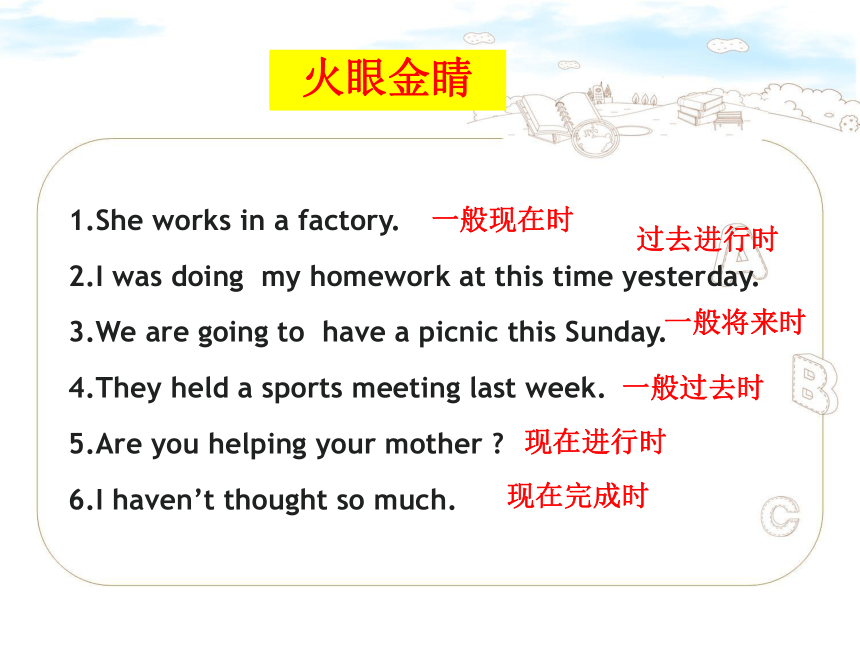
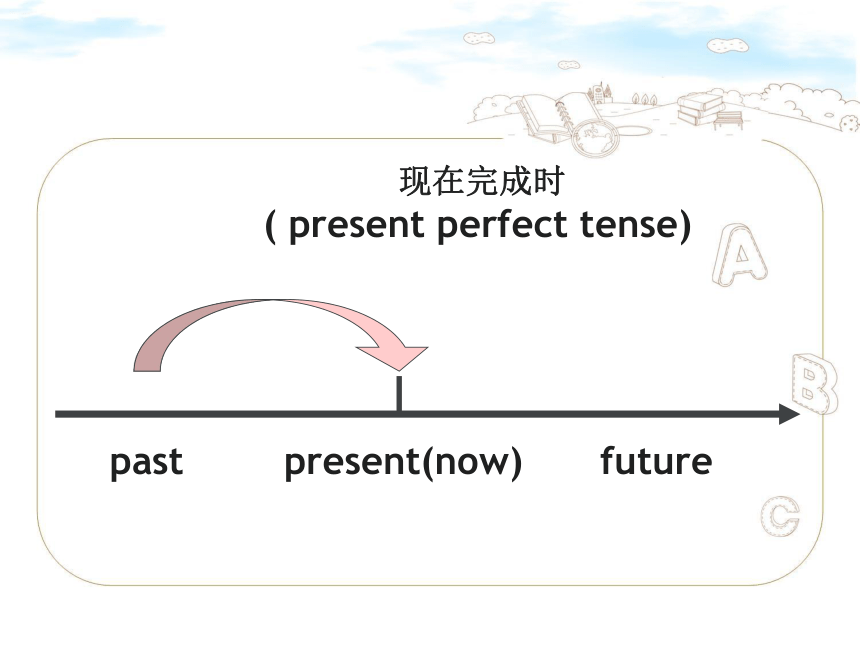
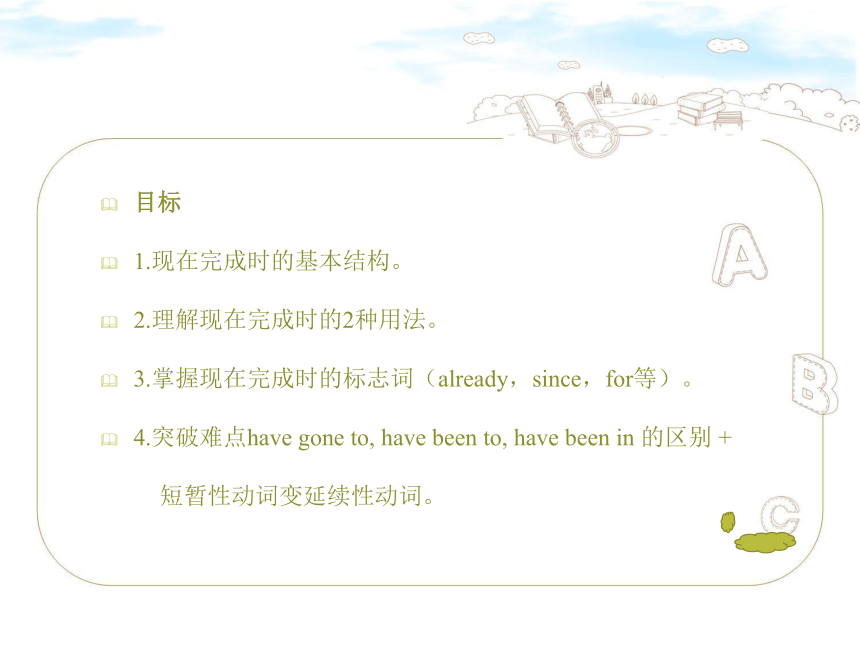


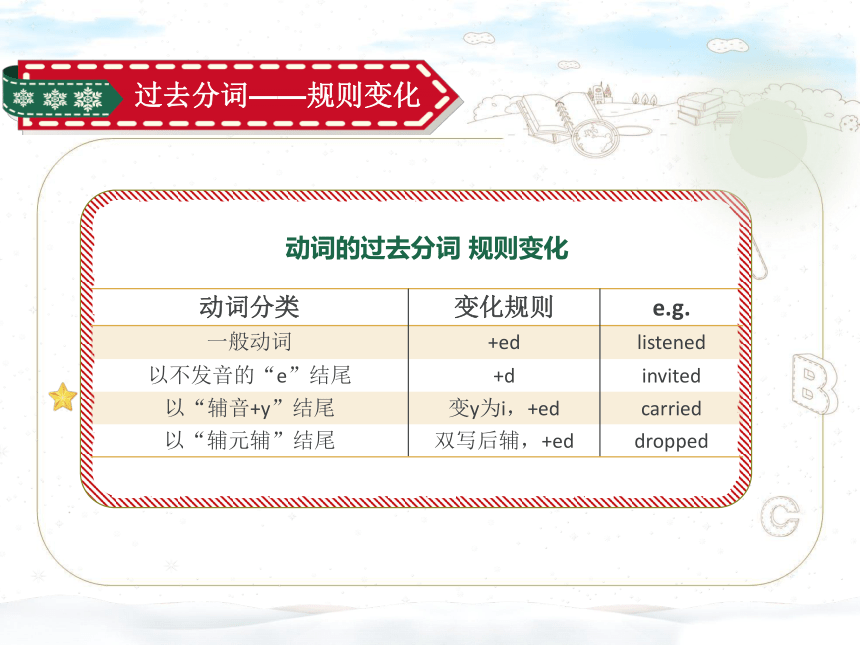


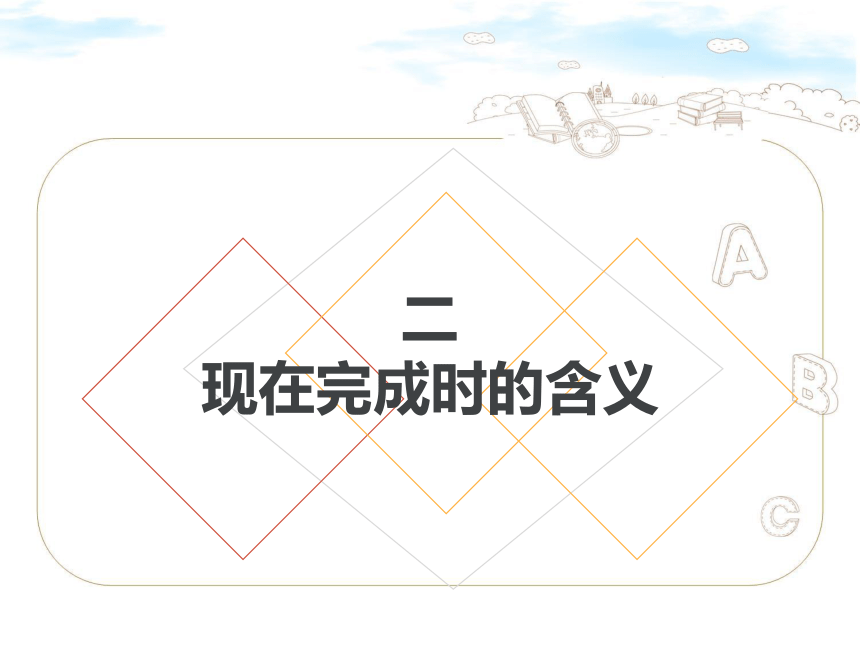
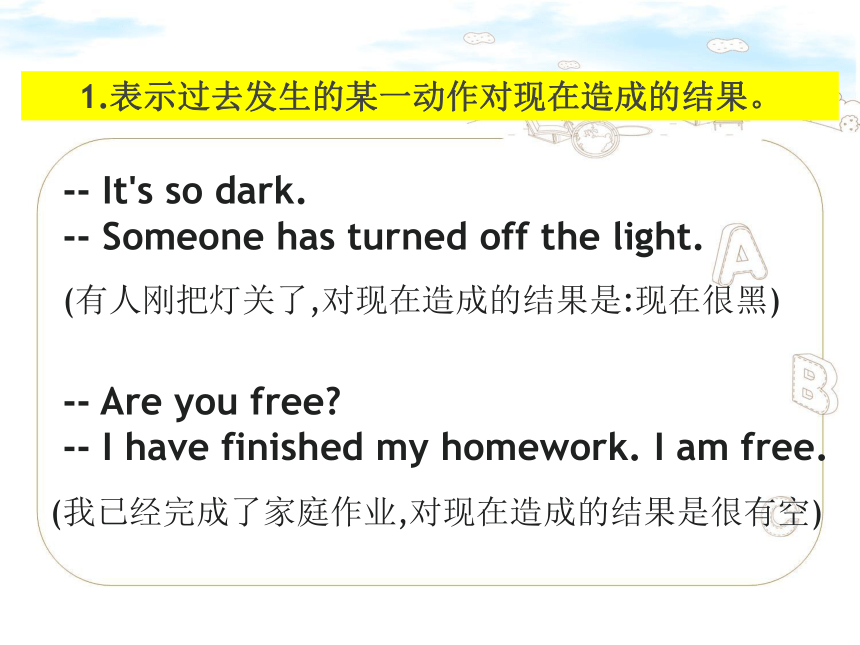
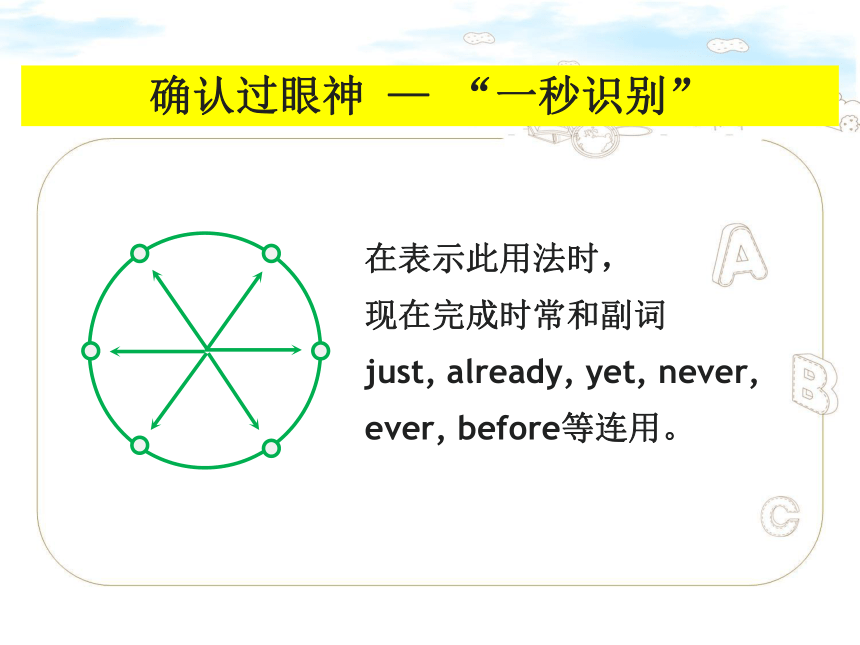
文档简介
(共51张PPT)
Irene
现在完成时
火眼金睛
1.She works in a factory.
2.I was doing my homework at this time yesterday.
3.We are going to have a picnic this Sunday.
4.They held a sports meeting last week.
5.Are you helping your mother
6.I haven’t thought so much.
一般现在时
过去进行时
一般将来时
一般过去时
现在进行时
现在完成时
present(now)
future
past
现在完成时
( present perfect tense)
目标
1.现在完成时的基本结构。
2.理解现在完成时的2种用法。
3.掌握现在完成时的标志词(already,since,for等)。
4.突破难点have gone to, have been to, have been in 的区别 +
短暂性动词变延续性动词。
一
现在完成时基本句型
圣诞老人的驯鹿们站错位置了,帮它们找到自己的位置吧!
助动词 Have / Has + 主语 + 动词的过去分词
Have you done your homework
主语 + 助动词 have/has + not + 动词的过去分词。
He hasn’t done his homework.
时 态 构 成
主语 + 助动词 have/has + 动词的过去分词。
I have done my homework.
肯 定 式
否 定 式
疑 问 式
过去分词——规则变化
动词的过去分词 规则变化
动词分类 变化规则 e.g.
一般动词 +ed listened
以不发音的“e”结尾 +d invited
以“辅音+y”结尾 变y为i,+ed carried
以“辅元辅”结尾 双写后辅,+ed dropped
work
visit
play
use
like
study
live
cry
shop
plan
stop
try
-ed
-d
y-i, +ed
双写-ed
快来帮圣诞老人整理圣诞礼物吧!
过去分词变化游戏
wonderful!
动词的过去分词 常见不规则变化
原型 过去式 过去分词 原型 过去式 过去分词
cost cost bring brought
build built catch caught
smell smelt say said
meet met find found
begin began leave left
blow blew break broke
forget forgot take took
我背诵,我快乐!
过去分词——不规则变化
cost
built
smelt
met
begun
blown
forgotten
brought
caught
said
found
left
broken
taken
二
现在完成时的含义
1.表示过去发生的某一动作对现在造成的结果。
-- It's so dark.
-- Someone has turned off the light.
-- Are you free
-- I have finished my homework. I am free.
(有人刚把灯关了,对现在造成的结果是:现在很黑)
(我已经完成了家庭作业,对现在造成的结果是很有空)
在表示此用法时,
现在完成时常和副词
just, already, yet, never,
ever, before等连用。
确认过眼神 — “一秒识别”
just表示"刚刚”
He has just come back.
他刚刚回来。
They have just finished the work.
他们刚刚完成那项工作。
already 往往用于肯定句,
用在疑问句时表示强调或加强语气。
He has already left here.
他已经离开这里了。
Has he already left here
他(真的)已经离开这里了吗?(表示加强语气)
yet 用于否定句和疑问句
My teachers haven’t had breakfast yet.
我的老师们还没有吃早饭。
(Yet在否定句中放句末,意为 "还(没)")
Have you written to your parents yet
你已经给你父母写过信了吗?
(Yet在疑问句中放句末意为 "己经” )
never 是否定词,表示"从来没有”
而ever 表示"曾经”
We have never been to the Great Wall.
我们从来没有去过长城。
Have you ever been to Canada
你们曾经去过加拿大吗?
before, 用于句末,表示“以前”
I've seen it before.
之前,我已经看过了。
Has she ridden a bike before
她以前骑过自行车吗
2.表示过去发生的动作一直延续到现在
Before
Now
Future
Five years ago, I became an English Teacher.
I am still an English teacher.
Maybe...
since: (自…以来)
1)since+时间点
He has stayed here since 5 o’clock.
2)since+ 时间段+ ago
He has stayed here since 5 hours ago.
3)since+ 从句(句中的谓语动词为过去式)
She has taught English since he came here.
for: (长达)
for+ 时间段
He has kept the book for 2 weeks.
对for或since引导的时间状语提问必须用how long, 决不能用when.
1.I have lived here for 10 years.
How long have you lived here
2.She has stood here since 2 hour ago.
How long has she stood here
选用 for和 since填空
1.We haven’ t seen each other ______ a long time.
2.His father has been in the Party ______ 10 years ago.
3.The film has been on ______ 20 minutes.
4.Mr Green has worked here ______ he came to China.
5.His grandparents have been dead ______ several years.
6. It’ s five years _______ we met last time.
for
since
for
since
for
since
7. I’ve taken driving lessons _______last month.
8. My sister has had her cell phone ______a month .
9. My friends haven’t visited me ______my birthday.
10. We haven’t used our car _____ a long time .
11. She hasn’t had a good cup of coffee ___ two years.
12. Tom has worn glasses _______he was 7 years old.
since
for
since
for
for
since
现在完成时的标志词
A. already
yet
never
ever
just
B. for
since
现在完成时
二、含义(用法):
1,过去做的事,对现在的影响和结果(现在没做了)。
2,表示过去发生的动作一直延续到现在(现在还在做)。
现在完成时和一般过去时区别
1. 两个句子都表示过去发生的事;
2. 现在完成时强调过去和现在的联系,不能和具体的时间状语连用;
3.一般过去时强调过去发生的事或状态,没有说明与现在的关系,它与
表示过去的具体时间连用。
(last, ago, yesterday, etc. )
present
past
I have lived here for two years.
I lived there 2 years ago.
现在完成时:
一般过去时:
他已学英语五年了。
He has studied English for five years.
他曾学过五年英语。
He studied English for five years.
(说明他还会继续学下去)
(只说明他过去学过五年英语,但现在不学了。)
现在完成时和一般过去时区别
强调这一动作产生的结果对现在的影响或结果,与现在有关。
仅表示在过去某一时刻曾发生过这一动作,与现在无关。
现在完成时和一般过去时区别
I’ve lived here for ten years.
我在这里住了10年。
I lived here for ten years.
我在这里住过10年。
He has bought a house.
他买了一栋房子。
He bought a house ten years ago.
他10年前买了一栋房子。
(现在是否仍拥有这房子不清楚)
(现在已拥有这房子)
(现在不住这儿了)
(现在仍住这儿)
现在完成时和一般过去时区别
yesterday, Last year, in May, in+过去某一年,two days ago, the other day, just now等 就用一般过去时 (表过去的时间)
so far, in/during/over the past/ last few days (在过去/最近的几年里),since接过去时间状语或 过去时的句子等常用现在完成时 (不能与确定的时间)
1. A: 火车已经开走了.
B: 什么时候开走的
A: 半个小时之前开走的.
2. A: 这本书我已经买了两年了.
B: 你在哪儿买的
A: 在我老家买的.
3. A: 你看过这部电影吗
B: 看过.
A: 什么时候看的.
B: 上周星期天看的.
A: The train has left.
B: When did it leave.
A: It left half an hour ago.
A: Have you seen the film
B: Yes, I have.
A: When did you see it
B: I saw it last Sunday.
A: I've had the book for two years.
B: Where did you buy it
A: I bought it in my hometown.
三
现在完成时短暂性动词变延续性动词
快来帮Mr. Snowman装饰圣诞树吧!
延续性动词
短暂性动词
know
open
want
close
buy
keep
have
live
read
sleep
stay
study
begin
go
become
leave
Game
congratulation!
buy
die
...
come(to)
leave
go
begin
start
finish
end
join
borrow
lend
瞬间动词
瞬间动词不能和时间段连用
Please point out any mistakes and correct
She has bought the computer for two years.
had
buy---have/has bad
She has had the computer for two years.
Please point out any mistakes and correct
How long have you come to the United States
been in
come to---have/has been in
How long have you been in the United States
Please point out any mistakes and correct
My brother has joined the army for five years.
been in / been a soldier
I have left Shanghai for 3 days.
have been away
I have been away Shanghai for 3 days.
Please point out any mistakes and correct
I have borrowed the book for 3 years.
have been kept
I have been kept the book for3 years.
Please point out any mistakes and correct
The film has begun for 10 minutes.
has been on
The film has been on for 10 minutes.
Please point out any mistakes and correct
The concert has finished for half an hour.
has been over
The concert has been over for half an hour.
Please point out any mistakes and correct
His dog has died for two years.
has been dead
His dog has been dead for two years.
Please point out any mistakes and correct
She has married for six years.
has been married
She has been married for six years.
短暂性动词变延续性动词
短暂性动词 延续性动词 短暂性动词 延续性动词
arrive/come/go to put on
borrow come
buy fall ill
become a begin/start
finish/end join
fall asleep wake up
open close
leave die
be in
keep
have
be a
be over
be asleep
be open
be away
wear
be here
be ill
be on
be in
be awake
be closed
be dead
Exercises
His father has died. (for 2 years)
The football match has begun.(since9:00a.m)
The twins have joined the army.
(since they are 18years old)
My teacher has just left Nanjing. (for 3 days)
His father has been dead for 2 years.
The football match has been on since 9:00 a.m.
The twins have been soldiers/ been in the army since they are 18years old.
My teacher has been away from Nanjing for 3 days.
注:※非延续性动词可以于现在完成时,表示动作已经完成,它不能跟段时间。 但它的否定式可以跟段时间状语连用.
Tom has left Beijing.
Tom hasn’t left Beijing since he came to this city in 2004.
He has borrowed a pen from me.
He hasn’t borrowed a pen from me since we argued.
四
现在完成时
have gone to,have been to
与have been in区别
现在完成时三种结构的区别
have gone to, have been to 与have been in
Black Panther has been to Wakanda many times.
Black Panther has been in Wakanda for 2 years.
Black Panther has gone to Wakanda .
Please point out any mistakes and correct
Ann has gone to China since three months ago.
been in
has gone to---have/has been in
Ann has been in China since three months ago.
Please point out any mistakes and correct
I have got to Paris for one week.
been in
has gone to---have/has been in
I have been in Paris for one week.
用have been to, have gone to, have been in 填空
1.Mike and his parents____________the north
for half a year.
2.Mum is not at home now. she ___________the shop.
3._____ you ever _____ to kunming Never.
4.Where _____ you ______ these days
6.Where is Peter I don't know where he ________.
have been in
has gone to
have been
Have been
has gone
SUMMARY
1.现在完成时的基本结构。
2.理解现在完成时的2种用法。
3.掌握现在完成时的标志词(already,since,for等)。
4.突破难点have gone to, have been to, have been in 的区别
短暂性动词变延续性动词。
光说不练假把式
语法练习
Homework
Irene
现在完成时
火眼金睛
1.She works in a factory.
2.I was doing my homework at this time yesterday.
3.We are going to have a picnic this Sunday.
4.They held a sports meeting last week.
5.Are you helping your mother
6.I haven’t thought so much.
一般现在时
过去进行时
一般将来时
一般过去时
现在进行时
现在完成时
present(now)
future
past
现在完成时
( present perfect tense)
目标
1.现在完成时的基本结构。
2.理解现在完成时的2种用法。
3.掌握现在完成时的标志词(already,since,for等)。
4.突破难点have gone to, have been to, have been in 的区别 +
短暂性动词变延续性动词。
一
现在完成时基本句型
圣诞老人的驯鹿们站错位置了,帮它们找到自己的位置吧!
助动词 Have / Has + 主语 + 动词的过去分词
Have you done your homework
主语 + 助动词 have/has + not + 动词的过去分词。
He hasn’t done his homework.
时 态 构 成
主语 + 助动词 have/has + 动词的过去分词。
I have done my homework.
肯 定 式
否 定 式
疑 问 式
过去分词——规则变化
动词的过去分词 规则变化
动词分类 变化规则 e.g.
一般动词 +ed listened
以不发音的“e”结尾 +d invited
以“辅音+y”结尾 变y为i,+ed carried
以“辅元辅”结尾 双写后辅,+ed dropped
work
visit
play
use
like
study
live
cry
shop
plan
stop
try
-ed
-d
y-i, +ed
双写-ed
快来帮圣诞老人整理圣诞礼物吧!
过去分词变化游戏
wonderful!
动词的过去分词 常见不规则变化
原型 过去式 过去分词 原型 过去式 过去分词
cost cost bring brought
build built catch caught
smell smelt say said
meet met find found
begin began leave left
blow blew break broke
forget forgot take took
我背诵,我快乐!
过去分词——不规则变化
cost
built
smelt
met
begun
blown
forgotten
brought
caught
said
found
left
broken
taken
二
现在完成时的含义
1.表示过去发生的某一动作对现在造成的结果。
-- It's so dark.
-- Someone has turned off the light.
-- Are you free
-- I have finished my homework. I am free.
(有人刚把灯关了,对现在造成的结果是:现在很黑)
(我已经完成了家庭作业,对现在造成的结果是很有空)
在表示此用法时,
现在完成时常和副词
just, already, yet, never,
ever, before等连用。
确认过眼神 — “一秒识别”
just表示"刚刚”
He has just come back.
他刚刚回来。
They have just finished the work.
他们刚刚完成那项工作。
already 往往用于肯定句,
用在疑问句时表示强调或加强语气。
He has already left here.
他已经离开这里了。
Has he already left here
他(真的)已经离开这里了吗?(表示加强语气)
yet 用于否定句和疑问句
My teachers haven’t had breakfast yet.
我的老师们还没有吃早饭。
(Yet在否定句中放句末,意为 "还(没)")
Have you written to your parents yet
你已经给你父母写过信了吗?
(Yet在疑问句中放句末意为 "己经” )
never 是否定词,表示"从来没有”
而ever 表示"曾经”
We have never been to the Great Wall.
我们从来没有去过长城。
Have you ever been to Canada
你们曾经去过加拿大吗?
before, 用于句末,表示“以前”
I've seen it before.
之前,我已经看过了。
Has she ridden a bike before
她以前骑过自行车吗
2.表示过去发生的动作一直延续到现在
Before
Now
Future
Five years ago, I became an English Teacher.
I am still an English teacher.
Maybe...
since: (自…以来)
1)since+时间点
He has stayed here since 5 o’clock.
2)since+ 时间段+ ago
He has stayed here since 5 hours ago.
3)since+ 从句(句中的谓语动词为过去式)
She has taught English since he came here.
for: (长达)
for+ 时间段
He has kept the book for 2 weeks.
对for或since引导的时间状语提问必须用how long, 决不能用when.
1.I have lived here for 10 years.
How long have you lived here
2.She has stood here since 2 hour ago.
How long has she stood here
选用 for和 since填空
1.We haven’ t seen each other ______ a long time.
2.His father has been in the Party ______ 10 years ago.
3.The film has been on ______ 20 minutes.
4.Mr Green has worked here ______ he came to China.
5.His grandparents have been dead ______ several years.
6. It’ s five years _______ we met last time.
for
since
for
since
for
since
7. I’ve taken driving lessons _______last month.
8. My sister has had her cell phone ______a month .
9. My friends haven’t visited me ______my birthday.
10. We haven’t used our car _____ a long time .
11. She hasn’t had a good cup of coffee ___ two years.
12. Tom has worn glasses _______he was 7 years old.
since
for
since
for
for
since
现在完成时的标志词
A. already
yet
never
ever
just
B. for
since
现在完成时
二、含义(用法):
1,过去做的事,对现在的影响和结果(现在没做了)。
2,表示过去发生的动作一直延续到现在(现在还在做)。
现在完成时和一般过去时区别
1. 两个句子都表示过去发生的事;
2. 现在完成时强调过去和现在的联系,不能和具体的时间状语连用;
3.一般过去时强调过去发生的事或状态,没有说明与现在的关系,它与
表示过去的具体时间连用。
(last, ago, yesterday, etc. )
present
past
I have lived here for two years.
I lived there 2 years ago.
现在完成时:
一般过去时:
他已学英语五年了。
He has studied English for five years.
他曾学过五年英语。
He studied English for five years.
(说明他还会继续学下去)
(只说明他过去学过五年英语,但现在不学了。)
现在完成时和一般过去时区别
强调这一动作产生的结果对现在的影响或结果,与现在有关。
仅表示在过去某一时刻曾发生过这一动作,与现在无关。
现在完成时和一般过去时区别
I’ve lived here for ten years.
我在这里住了10年。
I lived here for ten years.
我在这里住过10年。
He has bought a house.
他买了一栋房子。
He bought a house ten years ago.
他10年前买了一栋房子。
(现在是否仍拥有这房子不清楚)
(现在已拥有这房子)
(现在不住这儿了)
(现在仍住这儿)
现在完成时和一般过去时区别
yesterday, Last year, in May, in+过去某一年,two days ago, the other day, just now等 就用一般过去时 (表过去的时间)
so far, in/during/over the past/ last few days (在过去/最近的几年里),since接过去时间状语或 过去时的句子等常用现在完成时 (不能与确定的时间)
1. A: 火车已经开走了.
B: 什么时候开走的
A: 半个小时之前开走的.
2. A: 这本书我已经买了两年了.
B: 你在哪儿买的
A: 在我老家买的.
3. A: 你看过这部电影吗
B: 看过.
A: 什么时候看的.
B: 上周星期天看的.
A: The train has left.
B: When did it leave.
A: It left half an hour ago.
A: Have you seen the film
B: Yes, I have.
A: When did you see it
B: I saw it last Sunday.
A: I've had the book for two years.
B: Where did you buy it
A: I bought it in my hometown.
三
现在完成时短暂性动词变延续性动词
快来帮Mr. Snowman装饰圣诞树吧!
延续性动词
短暂性动词
know
open
want
close
buy
keep
have
live
read
sleep
stay
study
begin
go
become
leave
Game
congratulation!
buy
die
...
come(to)
leave
go
begin
start
finish
end
join
borrow
lend
瞬间动词
瞬间动词不能和时间段连用
Please point out any mistakes and correct
She has bought the computer for two years.
had
buy---have/has bad
She has had the computer for two years.
Please point out any mistakes and correct
How long have you come to the United States
been in
come to---have/has been in
How long have you been in the United States
Please point out any mistakes and correct
My brother has joined the army for five years.
been in / been a soldier
I have left Shanghai for 3 days.
have been away
I have been away Shanghai for 3 days.
Please point out any mistakes and correct
I have borrowed the book for 3 years.
have been kept
I have been kept the book for3 years.
Please point out any mistakes and correct
The film has begun for 10 minutes.
has been on
The film has been on for 10 minutes.
Please point out any mistakes and correct
The concert has finished for half an hour.
has been over
The concert has been over for half an hour.
Please point out any mistakes and correct
His dog has died for two years.
has been dead
His dog has been dead for two years.
Please point out any mistakes and correct
She has married for six years.
has been married
She has been married for six years.
短暂性动词变延续性动词
短暂性动词 延续性动词 短暂性动词 延续性动词
arrive/come/go to put on
borrow come
buy fall ill
become a begin/start
finish/end join
fall asleep wake up
open close
leave die
be in
keep
have
be a
be over
be asleep
be open
be away
wear
be here
be ill
be on
be in
be awake
be closed
be dead
Exercises
His father has died. (for 2 years)
The football match has begun.(since9:00a.m)
The twins have joined the army.
(since they are 18years old)
My teacher has just left Nanjing. (for 3 days)
His father has been dead for 2 years.
The football match has been on since 9:00 a.m.
The twins have been soldiers/ been in the army since they are 18years old.
My teacher has been away from Nanjing for 3 days.
注:※非延续性动词可以于现在完成时,表示动作已经完成,它不能跟段时间。 但它的否定式可以跟段时间状语连用.
Tom has left Beijing.
Tom hasn’t left Beijing since he came to this city in 2004.
He has borrowed a pen from me.
He hasn’t borrowed a pen from me since we argued.
四
现在完成时
have gone to,have been to
与have been in区别
现在完成时三种结构的区别
have gone to, have been to 与have been in
Black Panther has been to Wakanda many times.
Black Panther has been in Wakanda for 2 years.
Black Panther has gone to Wakanda .
Please point out any mistakes and correct
Ann has gone to China since three months ago.
been in
has gone to---have/has been in
Ann has been in China since three months ago.
Please point out any mistakes and correct
I have got to Paris for one week.
been in
has gone to---have/has been in
I have been in Paris for one week.
用have been to, have gone to, have been in 填空
1.Mike and his parents____________the north
for half a year.
2.Mum is not at home now. she ___________the shop.
3._____ you ever _____ to kunming Never.
4.Where _____ you ______ these days
6.Where is Peter I don't know where he ________.
have been in
has gone to
have been
Have been
has gone
SUMMARY
1.现在完成时的基本结构。
2.理解现在完成时的2种用法。
3.掌握现在完成时的标志词(already,since,for等)。
4.突破难点have gone to, have been to, have been in 的区别
短暂性动词变延续性动词。
光说不练假把式
语法练习
Homework
同课章节目录
- 词法
- 名词
- 动词和动词短语
- 动词语态
- 动词时态
- 助动词和情态动词
- 非谓语动词
- 冠词
- 代词
- 数词和量词
- 形容词副词及其比较等级
- 介词和介词短语
- 连词和感叹词
- 构词法
- 相似、相近词比较
- 句法
- 陈述句
- 一般疑问句和否定疑问句
- 特殊疑问句及选择疑问句
- 反意疑问句
- 存在句(There be句型)
- 宾语从句
- 定语从句
- 状语从句
- 主谓一致问题
- 简单句
- 并列句
- 复合句
- 主谓一致
- 主、表语从句
- 名词性从句
- 直接引语和间接引语
- 虚拟语气
- 感叹句
- 强调句
- 倒装句
- 祈使句
- 句子的成分
- 句子的分类
- 题型专区
- 单项选择部分
- 易错题
- 完形填空
- 阅读理解
- 词汇练习
- 听说训练
- 句型转换
- 补全对话
- 短文改错
- 翻译
- 书面表达
- 任务型阅读
- 语法填空
- 其他资料
